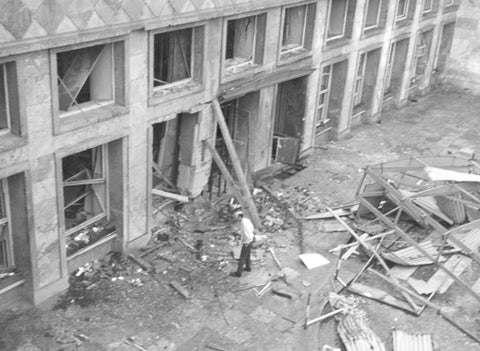"You are planning for the future at today’s prices"
This week, we sit down with David, a lifelong prepper, veteran and Customer Service Manager for the My Patriot Supply family.
If you missed David’s dispatches during Hurricane Irma, you can read them here.
 MPS: How long have you been with My Patriot Supply?
MPS: How long have you been with My Patriot Supply?
David: I took my first order in May of 2013. Before that, I helped package seeds at home. Shortly after joining customer service, we began selling a wider array of survival supplies, including food.
How did you get started with preparedness?
My family has practiced for years. When I was a child, that’s where it all began. We always had gardens – even on the military bases we had garden plots.
I decided to join the military the day after my 14th birthday, in May 1972. That is the day that the Baader Meinhof gang or the Red Army Faction blew up the 8th army headquarters or the IG Farben building (in Frankfurt, Germany, the place of my birth) as we referred to it at the time. It happened during a baseball game we were playing, we saw the flash and then heard the explosion.
My father, who was the coach of the team we were playing said that we should continue to play the game for if we quit then the terrorists win. All they wanted was for us to change our way of life. So, if we gave in and went home then they would have won.
There was a very quick response from the US Army, they deployed to the housing area to ensure that we remained safe. It was at that moment that I decide I was going to be part of that – protecting this country. I was also present for the Israeli massacre at the ‘72 Olympics in Munich.
That day, I decided I wanted to be a part of this, protecting our country.
What do you tell people who are just getting started with preparedness?
You can do it in an affordable way if you start early. But too often people think about food first, then water. But it should be the opposite. What happens in a crisis? The taps go off and water quickly becomes contaminated. You cannot go for more than a few days without water, which is why you should take care of that early on.
Once people get the basics covered, what second or third steps do you recommend?
Generally, a lot of folks have a fixed amount budgeted to spend on prepping. So, it will depend on their goals and their budget.
I usually ask people: “Where do you want to be in January of next year?” From there, it’s easy to help them get there.
If we know how many people you’re preparing for, for how many days, and know your budget, it’s easy to help you get there. We don’t want to sell you something you don’t need – so it’s easier if we can identify what you may need.
What do you wish people knew about preparedness that they don’t often realize?
One thing I tell people a lot, especially about emergency food. You are planning for the future at today’s prices. If a crisis doesn’t happen and you still have food 25 years later, it’s still good to eat and use up.
One more thing: it’s imperative that you try the food. Cook it primitively, just as you will have to in a crisis. The last time you want to try it is when your life depends on it. The world can change in a hurry.
Any final pieces of wisdom?
My father always told us when we were little:
If you prepare for a disaster, that disaster will never happen. Because if that disaster occurs, it will only be an inconvenience to you, but a disaster to those who haven’t prepared.
Also, know that preparedness truly is a journey. Almost nobody can do it all in one go. If you have to do it in one go, it’s too late. As we saw with the recent hurricanes, if you know it’s coming it’s too late. We can ship it to you, but the carriers will not bring it in with a storm bearing down.
Finally, don’t count on FEMA. Knowing you can rely on yourself is the only solution.
Thank you, David!
We hope you found today’s interview to be helpful and inspiring.
Have a great weekend friends – but remain vigilant!
In Liberty,
Elizabeth Anderson
MPS Preparedness Advisor


 MPS: How long have you been with My Patriot Supply?
MPS: How long have you been with My Patriot Supply?